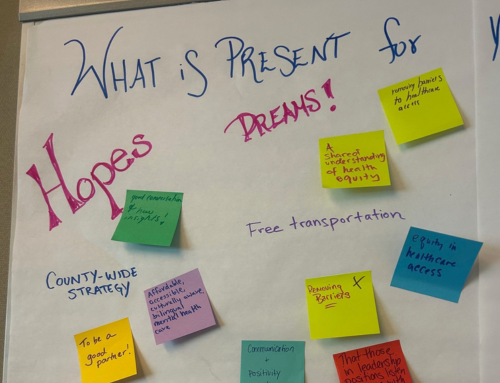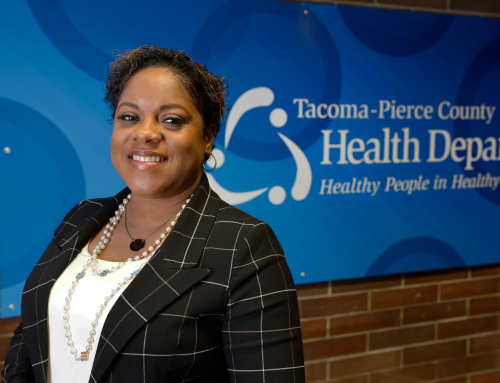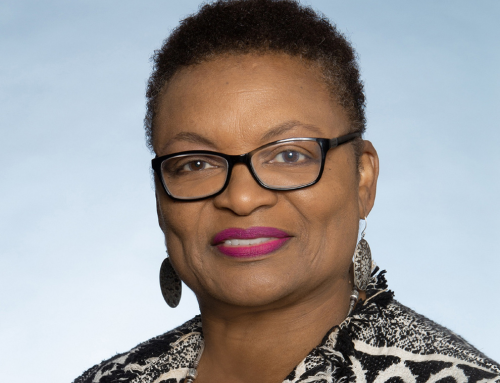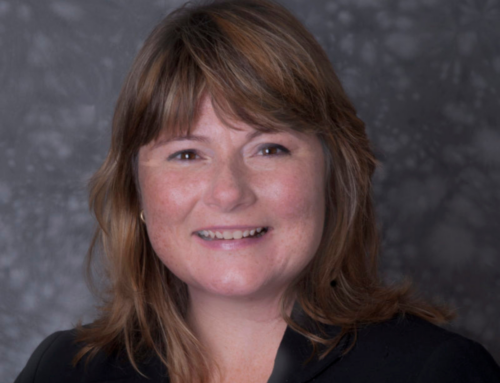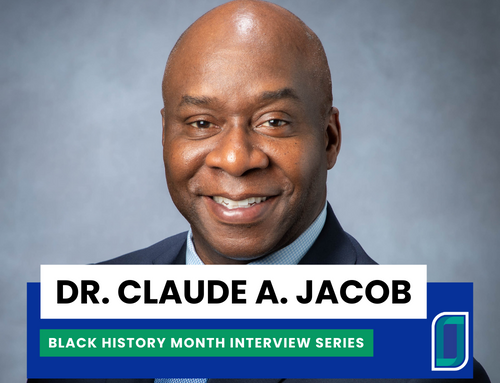Mysheika Roberts, MD, MPH, the Health Commissioner of the Columbus Public Health Department (CPHD), shared insights into her journey in public health, exploring key moments in her career, her views on public health accreditation and transformation, and her commitment to diversity and equity. From her early experiences as a college student in Los Angeles to her current role leading a diverse team in Ohio, Dr. Roberts has been dedicated to positively impacting her community and public health.
Dr. Robert’s Journey
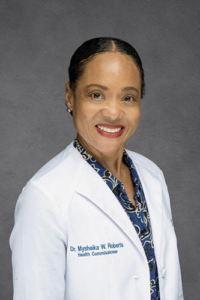 Dr. Roberts’ public health journey began during college while in Los Angeles. As an avid sports fan and admirer of Magic Johnson, she recalls the announcement of his HIV-positive status. The announcement challenged ongoing stereotypes about HIV at the time, sparking an interest in public health and leading her to pursue a master’s degree in the field.
Dr. Roberts’ public health journey began during college while in Los Angeles. As an avid sports fan and admirer of Magic Johnson, she recalls the announcement of his HIV-positive status. The announcement challenged ongoing stereotypes about HIV at the time, sparking an interest in public health and leading her to pursue a master’s degree in the field.
While earning her master’s degree, Dr. Roberts rediscovered her passion for medicine, following in the footsteps of her physician father. After her residency, she found the perfect blend of medicine and public health as the medical director for an STD clinic in Baltimore, Maryland.
Dr. Roberts expressed a desire to lead a local health department, and her boss encouraged her to apply for the Epidemic Intelligence Service (EIS) program at the CDC. Despite an initial reluctance to move to Ohio, this opportunity allowed her to gain a unique perspective on public health—from the federal level at the CDC to being stationed at the state and working on outbreaks at the local level. This experience, she believes, gave her a vantage point that laid the foundation for her current role as Health Commissioner.
Public Health Accreditation and Quality Improvement
Dr. Roberts emphasized the positive changes in processes and systems because of PHAB accreditation. Accreditation has encouraged a culture of continuous improvement, making the health department more efficient and effective in serving the community.
“[Accreditation] made us a better health department,” Dr. Roberts expressed. “It has allowed us to help our residents and community much more efficiently and effectively today than before being accredited.”
One example of accreditation in practice was the department’s tobacco inspection process. The department was conducting approximately 400 tobacco inspections per year but realized they needed to do more to ensure retailers were compliant with Tobacco 21. After a quality improvement assessment using tools from the accreditation process, the department increased inspections to about 2,000 per year.
The Columbus Public Health Department is continuously looking for ways to raise the bar and provide the best services to its residents. To elevate public health, Dr. Roberts emphasized accreditation and the daily commitment to excellence as crucial. A dedicated team, including members at the senior leadership level, focused on accreditation and quality improvement has been instrumental in decision making and developing and implementing new services and programs.
“Accreditation is not something that just comes around every five years; it’s year-round and daily,” Dr. Roberts noted. “Here at Columbus Public Health, we have staff dedicated to this work every single day.”
Dr. Roberts also underscored the importance of transforming public health systems to operate more like business models, focusing on outcomes and impact. In the wake of the COVID-19 pandemic, government agencies should continually evaluate and improve their work, adapt, and find innovative solutions to meet the evolving needs of communities.
“Being PHAB accredited forces us to think differently,” Dr. Roberts said. “…just because we’re a government agency doesn’t mean we can’t work like a business model; it doesn’t have to be about income and how much money we’re making, but it should really be about outcomes and the impact we’re making.”
Equity and Diverse Leadership
Diversity has been a hallmark of Dr. Roberts’ work at Columbus Public Health. She expressed pride in the diversity of her team, reflecting the community they serve.
“I’m quite proud of my department…we have over 500 staff, and our staff really reflect the community we serve,” Dr. Roberts expressed. “We have lots of individuals who speak another language, and they can use those language skills in their daily work.”
The mayor’s declaration of racism as a public health issue in 2020 ramped up efforts for the department significantly. One initiative that highlights the department’s focus on equity was the creation of the “Opportunity Clinic” in response to the pandemic. The Opportunity Clinic, located at the health department, focused on Black, Brown, and low-income neighborhoods to provide equitable access to the COVID-19 vaccine. Residents could call Dr. Roberts’ administrative office to schedule an appointment and receive a vaccine directly at the department, which is centrally located and familiar to the community.
“… we really tried to accommodate our community so that they could be protected just like everybody else,” Dr. Roberts noted.
Dr. Roberts also emphasized the need for leaders with varied experiences and perspectives and highlighted the value of leaders who have faced adversity, as they bring a different perspective to decision-making.
“The communities we serve today, whether it’s here in Columbus, Ohio, or Milwaukee, or any place else, are very diverse. And so, it’s important that we have leadership and staffing that reflect that diversity,” Dr. Roberts said.
For emerging leaders, Dr. Roberts encourages them to be patient and genuine and reminds them that leadership is a privilege that is earned through time, not a right.
“Public health is a very rewarding career; I wouldn’t trade it for anything,” Dr. Roberts concluded.
